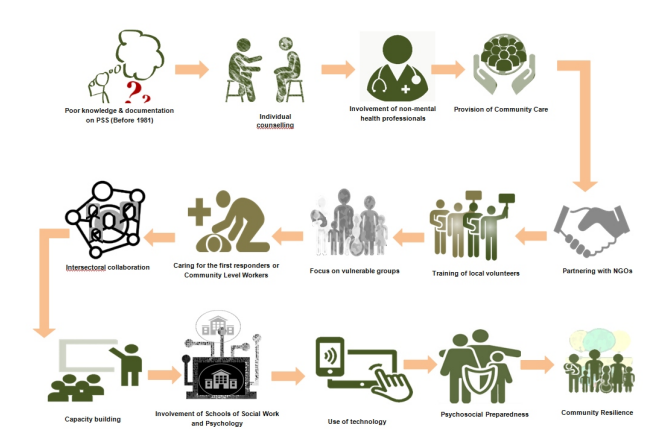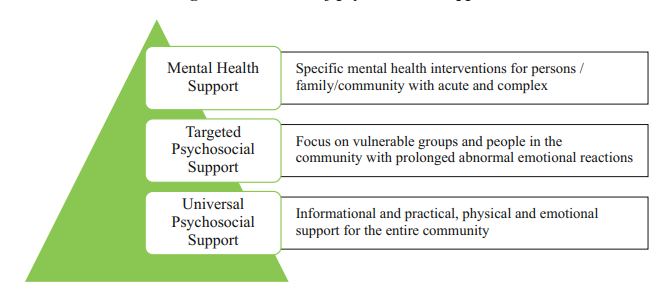Psychosocial Support in Disasters
Psychosocial Support in Disasters
 Disaster-affected communities experience various psychological reactions which are often determined by social factors, such as; homelessness, loss of employment, destruction of the surrounding environment, loss of dear ones etc. These psychological problems remain unnoticed unlike physical symptoms.
Disaster-affected communities experience various psychological reactions which are often determined by social factors, such as; homelessness, loss of employment, destruction of the surrounding environment, loss of dear ones etc. These psychological problems remain unnoticed unlike physical symptoms.
Psychological First Aid (PSFA) is the entry point for psychosocial care interventions. Providing opportunities for people to express their concerns and connecting people with spectrum of psychosocial services enable speedy recovery. Psychosocial Support (PSS), in the context of disasters refers to comprehensive interventions aimed at addressing a wide range of psychosocial problems arising in the aftermath of a disaster. In the past, we see that distributing material relief and focus on physical reconstruction (body and environment) take priority during disasters. Integration of PSS along with other relief services enhance resilience among disaster-affected communities. Prompt and systematic psychosocial support services help in early identification and treatment of mental health problems.
Evolution of Psychosocial Support in India
 Psychosocial support is an integral part of Indian culture and religion. It gives dominance to rendering care for the weaker sections of the society, customs and practices that facilitate ventilation after loss and values that build community resilience. Many stakeholders have involved in the administration of psychosocial care services in the past. Large volume of work done in the area remain undocumented. The first documentation of psychosocial support appeared in 1981 after the Venus Circus Tragedy in Bengaluru. The initial phases were more individual centric and rendered by mental health professionals. There is shortage of work force in the field of mental health service delivery in India. Considering the Indian population and the magnitude of the psychosocial needs of disaster affected communities, training of non-professionals especially the local community in psychosocial care service delivery has become a time-tested effective model.
Psychosocial support is an integral part of Indian culture and religion. It gives dominance to rendering care for the weaker sections of the society, customs and practices that facilitate ventilation after loss and values that build community resilience. Many stakeholders have involved in the administration of psychosocial care services in the past. Large volume of work done in the area remain undocumented. The first documentation of psychosocial support appeared in 1981 after the Venus Circus Tragedy in Bengaluru. The initial phases were more individual centric and rendered by mental health professionals. There is shortage of work force in the field of mental health service delivery in India. Considering the Indian population and the magnitude of the psychosocial needs of disaster affected communities, training of non-professionals especially the local community in psychosocial care service delivery has become a time-tested effective model.
The constitution of National Disaster Management Authority (NDMA), State Disaster Management Authority (SDMA) and District Disaster Management Authority (DDMA) constituted to plan, execute and monitor disaster management policies and its implementation. This helps in instrumentation of psychosocial support and mental health services in the country. Major psychosocial services are carried out during the relief and restoration phase. The preparedness and mitigation efforts in PSSMHS is in progress and need to be further expanded.
Psychosocial factors impacting the mental health of disaster affected communities
- Age
- Gender
- Marital status
- Vulnerability status
- Personal losses
- Nature and severity of the disaster
- Availability of social support
- Amount of exposure to disaster
- Displacement from locality
- Separation from family
Psychosocial Support (PSS) activities
- Creating capacity (professional and non-professional bodies including the community) on Psychosocial Care activities in the affected communities.
- Awareness generation on psychosocial and mental health issues and services available.
- Recreation and group activities- facilitating group mourning by ensuring religious or culture specific services to cope with the loss of the loved ones, initiating community kitchens, encouraging recreation and group sharing.
- Empowering communities through multi-sectoral collaboration involving governmental, non-governmental and voluntary bodies.
- Facilitating individual centric care for disaster survivors (listening to the individual, providing reassurances, being available and assessing their needs and resources).
- Updating and supporting the careivers with information, resources and self-care strategies.
- Linking community to services to enhance livelihood options, reconstruction of homes, getting compensation, etc.
Adapted from Seto et al., 2019
| Psychosocial support ‘IS’ | Psychosocial support ‘IS NOT’ |
|
|
Levels of psychosocial support

Last Modified : 11/23/2023
This topic covers the information about Policies a...
Provides summary of District Disaster Management P...
This topic covers the information about National D...
This topic provides information about Internationa...
